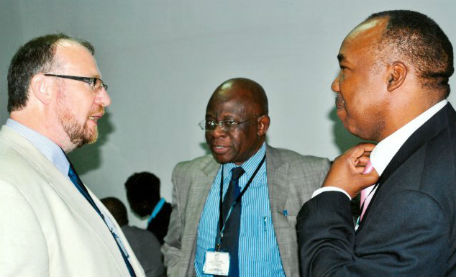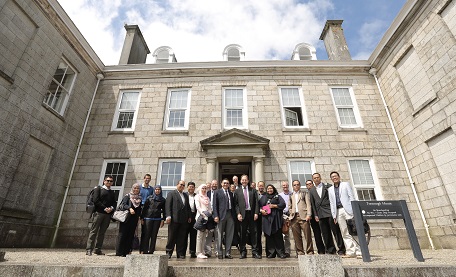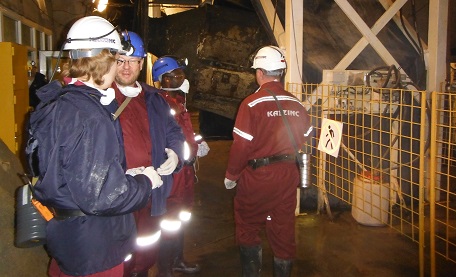
Prof Kip Jeffrey is Technical Advisor to Zambia Mining Sector Education Trust (ZAMSET)

In June 2014, CSM hosted a meeting with Menteri Besar Inc., representing the Malaysian State of Perak, and ITRI to discuss the Tin Valley Mining Vision

In March 2014 the Mining Education team coordinated a workshop connecting early career researchers in the UK and Kazakhstan
Mining futures
Mining Futures
Mining Futures
There is a global shortage of skilled mining professionals and Camborne School of Mines are developing innovative techniques in mining education to fill this gap. CSM works in collaboration with governments, industry, regulatory, education, and training organisations across the globe.
Our work spans a range of initiatives including:
- Training university staff in mining education best practice
- Developing researcher networks across emerging mining countries
- Overseeing international mining skills development programmes
- Assisting government-level strategy in the responsible development of mineral resources
- Developing and teaching innovative blended learning programmes for mining professionals
Presentations, conferences and papers
- Jeffrey, K., 2014, 'Minerals Maketh Man' (recording), Inspiring Science lecture series at University of Exeter College of Engineering, Mathematics, and Physical Sciences, United Kingdom, 19 November 2014.
- Jeffrey, K., Hameed, A., McFarlane, D., 2014, ‘Mining education pathways for mining countries’ (Pdf), presented at Mineral Deposit Studies Group 37th Annual Winter Meeting, University of Oxford, United Kingdom, 7 January 2014
- Jeffrey, K, 2013, ‘Bespoke mining education courses – company specific business solutions’, presented at 24th Annual General Meeting of Society of Mining Professors (SOMP), Milos Island, Greece, 27 June 2013.
- Jeffrey, Kip, 2013, ‘The next generation of mineral industry professionals – industry expectations and how best to train them’ (Pdf), presented at Sustainable Development in the Minerals Industry, Milos Island, Greece, 1 July 2013.
Collaborations
Prof Kip Jeffrey is Technical Advisor to Zambia Mining Sector Education Trust (ZAMSET), an agreement between mining companies, government, education providers, and other stakeholders to develop mining education capacity in Zambia. The African Development Bank has already placed one million USD, along with contributions from First Quantum Minerals Ltd., among others. ZAMSET is developing career pathways, building training facilities, and supporting higher education institutions to address the skills gap across the world-class Copperbelt.
Other partners and related projects include:
- Swedish Government and Volvo Foundation – funding ZAMSET pilot projects
- Sentinel mine – the strategy and recruitment of 1200-1500 staff at major development
Camborne School of Mines have signed a memorandum of understanding with Menteri Besar Inc (MB), to help develop a blueprint for sustainable mineral development. The creation of “Tin Valley” is a flagship project for MB Inc. and this exciting partnership will deliver knowledge sharing, training, research and innovation to benefit the people and economy of Malaysia. To find out more, read the news story about this partnership.
External news coverage
To geoscientists, Kazakhstan is still a relatively unexplored area. To conduct vital research in the region, a workshop was coordinated to connect early career researchers in both the UK and Kazakhstan. Camborne School of Mines' Mining Education research group were assigned as a key organiser of the event, along with other partners including East Kazakhstan State Technical University and the Natural History Museum.
CSM participants included Prof Pat Foster, Prof Kip Jeffrey, Dr Jens Andersen, Dr Kate Littler, and Dr Daniel Parvaz. Support was provided by the British Council Researcher Links initiative.
In partnership with First Quantum Minerals Ltd, Prof Kip Jeffrey is involved with the strategic development of Cobre Panama, one of the world’s largest new copper mining projects. This involves:
- Securing a 2,000 employee workforce
- Building education and training capacity
- Government partnerships
- Local community outreach and initiatives
In 2013, the Mining Education team participated in two visits with engineering staff from Finland on the development of mining courses. The partnership assisted the Lapland University of Applied Sciences and Kajaani University of Applied Sciences, and was supported by First Quantum Minerals Ltd and Kevitsa Mining.
Camborne School of Mines hosted a government visit from Rwanda on mining education and skills development. As part of Rwanda’s ‘Vision 2020’ to promote mineral investment and capacity building, the Mining Education team is involved with government ministers planning skills development, staff training, and research collaborations. Rwanda hosts significant wolframite, cassiterite, niobotantalite, and deposits with potential in other key minerals, industrial/construction materials, and energy resources. Mining is the biggest source of export revenues, and therefore the minerals industry is a crucial component to income generation and macroeconomic stability.
The UK is internationally recognised as a centre of excellence in the provision of skills and education to the mining industry. The demand for skilled and experienced staff in the global mining sector continues to outstrip supply, placing training and development firmly in government and corporate agendas. The global mining skills shortage has been cited as one of the biggest risks to the industry over the next decade, and the UK academic and education sector can help meet this challenge.
2014
- In July, Prof Kip Jeffrey was called upon by Parliament's Energy and Climate Change Committee to discuss the significance of mining education as it relates to the challenge of deep coal mining in the UK and impending colliery closures. Regarding the supply of skilled workers to industry, he reminded MPs that "Skills shortages are not just issues around individual mines - they are on a global basis" and that the "diaspora of mining specialists" in the UK will be indirectly and significantly impacted. Watch the discussion here.
- Prof Patrick Foster gave testimony in May 2014 to the Parliament’s inquiry into the Extractive Industries Sector. Read oral evidence given by Dr Foster.
2013
- In October 2013, Prof Kip Jeffrey participated in the UK Trade & Investment forum to strengthen UK mining industry producers and service providers. Prof Jeffrey spoke about innovative solutions in education and training provision such as blended learning courses and company-tailored mining schools. Read the UK Trade & Investment report: 'UK – Delivering Global Mining Solutions'
- As a leading global source of mining finance, the UK supports and delivers a range of professional services and industry expertise. Recognising the significance of skills provision, learning and knowledge transfer to emerging mineral economies, the Mining Education team at CSM is committed to projects that help deliver sustainable economic prosperity here, and to local communities and businesses abroad.
Projects
The Mining Education team has specialist expertise delivering web-based distance learning programmes, previously partnering with De Beers and The Diamond Trading Company to deliver the ‘Diamond Professional’ Graduate Certificate Programme. The programme was designed to build a commercial understanding of how value can be created across the entire diamond pipeline.
The programme operated from 2009 – 2012, equipping talented De Beers and DTC employees with the skills and hands-on knowledge to work in different international locations and enhancing the diamond skills in southern Africa for both the family of De Beers companies and the host countries in which it operates. In addition to interactive, web-based distance learning, students travelled on international residential courses and gave presentations to senior managers, visited and analysed company operations across southern Africa and learned specialised skills at DTC Diamond Academy training centres.
The programme informed performance management with a robust measure of Return on Investment (ROI) for De Beers. This was seen as a vital part of talent development strategy, retaining a pool of knowledge in-house, and continuing even through the global recession.
Prof Kip Jeffrey was previously Distance Learning Course Director, which included coordinating delivery of the UK’s first postgraduate course designed specifically for the quarrying industry, in partnership with Lafarge and Holcim.
The one-year postgraduate certificate in quarry management and operations took a blended learning approach as it combined distance learning with part-time work and residential programmes. Rather than lecture theatres, teaching was performed at the rock-face in local quarries and delivered by high-level experts from within the two companies. These courses were designed for experienced quarry workers and recent graduates needing fast-track skills development and gave students a full exposure to the breadth of the aggregates industry, tailored to meet the specific needs of senior managers.
